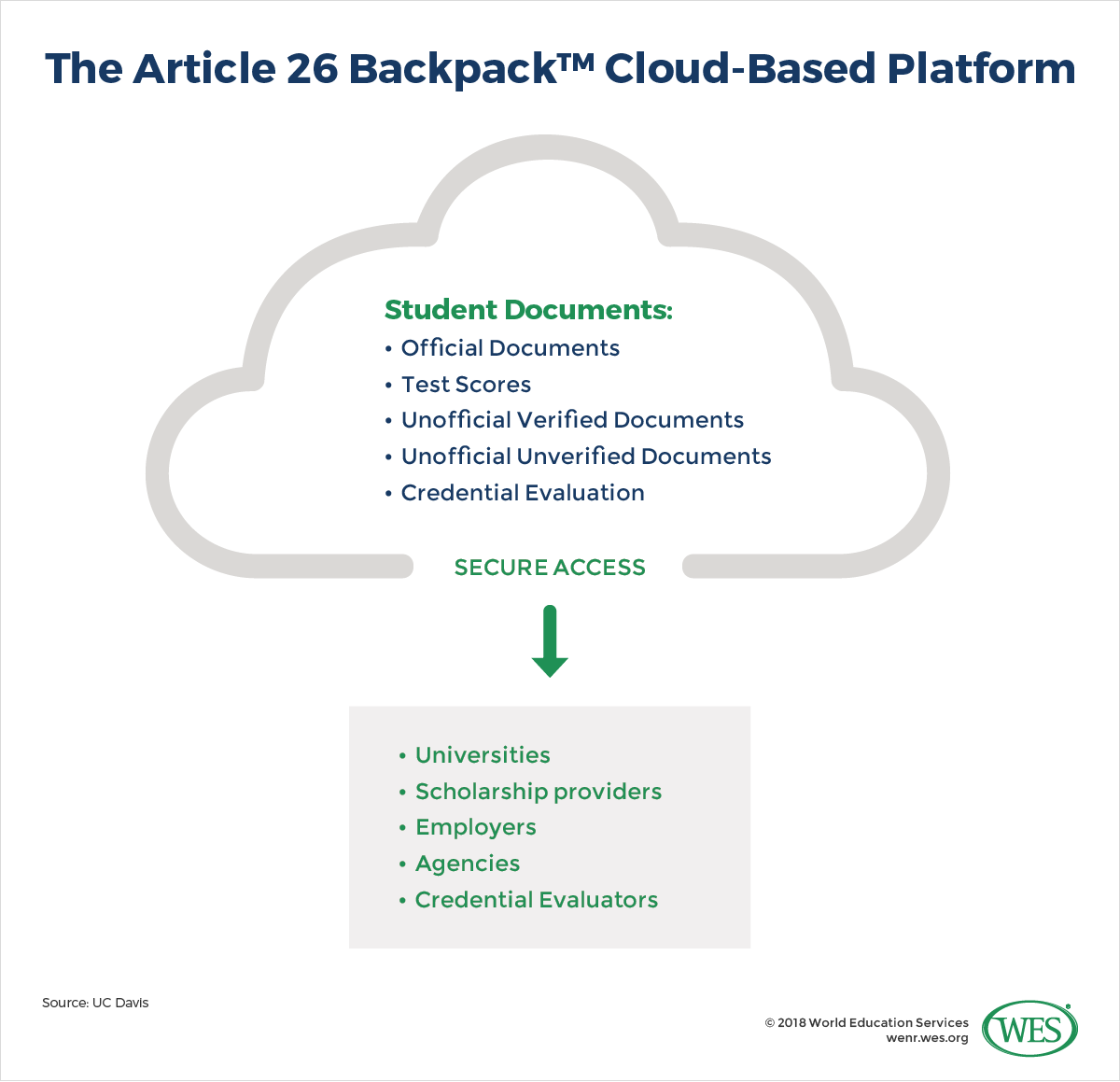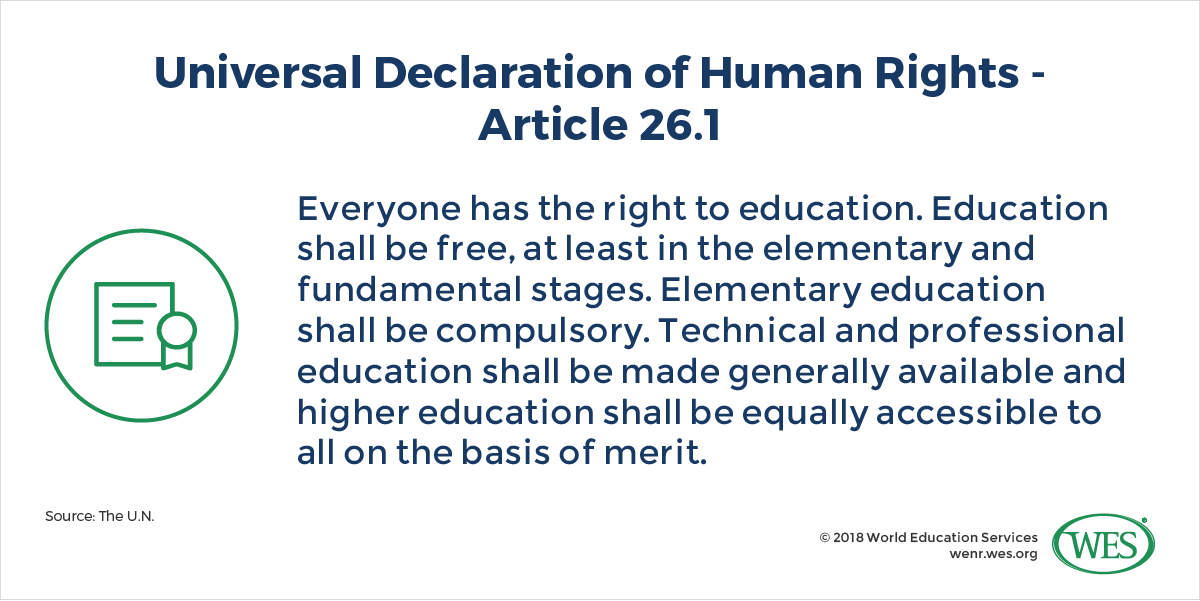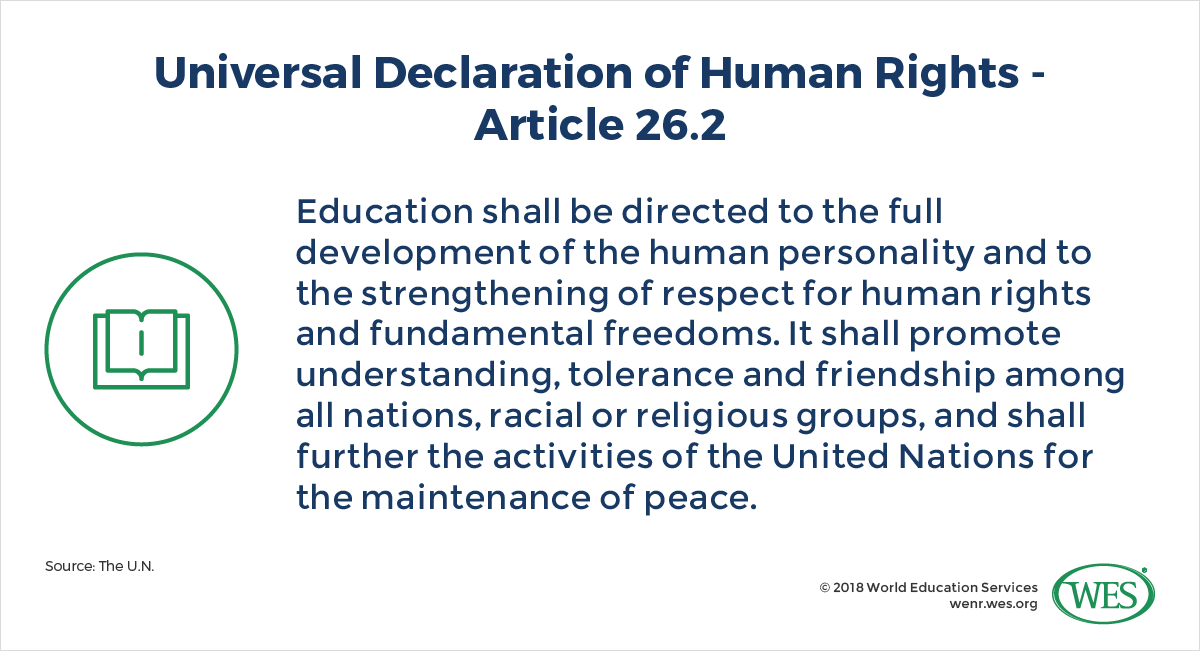The Article 26 Backpack: A New Tool for Empowering Vulnerable Youth
Hana Addam El-Ghali, Senior Program Coordinator for the Education and Youth Policy Research program at the Issam Fares Institute for Public Policy and International Affairs at the American University of Beirut (AUB)
The last three years have seen an enormous amount of concern about the impact of crises on access to higher education. More than 66 million people are, due to crises of one kind or another, on the move around the globe. Many are refugees, and many are highly educated.
The question of how to effectively provide higher education to these young people is critical to ensuring that war and conflict don’t create a disaffected and “lost” generation of displaced youth.
Technology provides at least a partial answer to this question.
The Article 26 Backpack™ was developed as a new human rights tool for vulnerable student academic and employment mobility. The team behind the backpack, Dr. Keith Watenpaugh of the University of California Davis, working in collaboration with experts at the American University in Beirut, and the American Association of Collegiate Registrars and Admissions Officers, has extensive experience working with university-age refugees, especially refugee populations in Lebanon.
What Is the A26 Backpack?
The A26 Backpack is truly revolutionary. It is designed to securely allow refugees and vulnerable youth to overcome some of the structural and bureaucratic obstacles as they seek to exercise their right to education, as defined by the 1948 Universal Declaration of Human Rights that establishes education as basic human right. Specifically, it provides a way for at-risk youth and others to safely store and securely share educational records and achievements with universities, scholarship providers, employers, and agencies. In limited cases, it also provides them with an opportunity to have academic credentials assessed and educational histories reconstructed.
The Article 26 Backpack™ was piloted in Lebanon in November 2017, after a lengthy consultation with registrar and admissions officers from leading institutions of higher education in the country, the Ministry of Education and Higher Education, and non-governmental organizations actively working with Syrian youth. This consultation was followed by field implementation working in three sites across the country to recruit “Backpackers.”
The pilot allowed the researchers to explore human and digital elements of the Backpack in actual field conditions. Consultations with key stakeholders from the field revealed the potential use of the Backpack for scholarship providers in recruiting potential recipients in an efficient way that does not present an overlap among the providers – good news for students who were previously sidelined as a result of this duplication. Additionally, the A26 Backpack allowed students to complete one set of information that may then be used for a number of scholarship providers instead of having to complete multiple scholarship applications and provide the same documentation to several parties.
The pilot also demonstrated that Lebanon’s higher education and refugee support communities will advocate for the Backpack, and that young people in host communities can be empowered to competently and safely help refugees and displaced young people use this new human rights tool. This was particularly evident as young people – currently students at local universities – worked closely with refugee youth who were either enrolled or seeking to enroll in a program at a local institution.
The cooperation among the young people revealed that there are characteristics of the Backpack that go beyond what it is intended.
- The communication and interaction between young people who are already within the higher education system and may have been exposed to some of the issues and challenges the new backpackers are facing provides the opportunity for peer-to-peer learning, which in many cases may seem more effective than seeking other channels of information.
- The process of completing one’s Backpack proved to foster self-assessment and the identification of educational and employment goals for young people who often do not have a structured opportunity to do so.
- It also presented opportunities for legal and academic counseling for which community organizations and NGOs may address.
Outlining the Need
Before the start of the Syrian conflict, the country was home to some 22 million people. In 2017, the U.N. estimated that 13 million had been displaced. Some 5.5 million were categorized as refugees. Addressing access to higher education among refugee populations is essential for constructive contribution towards the rebuilding of Syria. It is also important for the sustainable development of the host communities such as Lebanon, where around a million Syrian refugees are currently registered.
The A26 Backpack makes it convenient for atypical students to manage this challenge bypassing any security threats that may be associated with the process of authenticating and validating prior learning.
As the number of refugees increases across most host countries in the MENA region, it is critical to note that fewer refugee youth are enrolling in higher education institutions, such as in Lebanon. The number of Syrians enrolled in universities dramatically decreased after the start of the crisis. It has become increasingly difficult for young people from Syria to secure authenticated copies of official academic documents, as new economic burdens have emerged for securing such documents. Recently, the Syrian authorities have been facilitating the process of authenticating academic documents; however, it remains a challenge for many who may find it threatening to seek such authentication. It is also challenging for institutions of higher education outside of Syria to accept students’ credentials and admit them and to help complete their academic degrees, particularly with threats of fraudulent activities reported by the Syrian authorities to be on the rise.
Recent research has shown that one of the major challenges to accessing higher education among refugee youth has been the lack of authenticated academic documentation to prove prior learning. A scholarship provider interviewed in Lebanon explained that “Nothing has been affecting our work except for students who did not get their professional qualification documents”. The difficulty in securing such documents presents yet another hurdle in the admission process to universities who struggle to assess the credentials of applicants and thus are forced to dismiss admission decisions in many cases or request that students register for courses they may have already completed in previous learning experiences.
The Arab Context
Although regional and local host country policies dictate the provision of education, including higher education, to refugees in countries of the Middle East, many challenges further complicate the continuous pursuit of education. Many of these challenges are quite difficult to address as they are closely intertwined within political systems that are beyond the scope of any quick fix.
Those seeking higher education have been particularly affected as opportunities to pursue higher education become quite limited and contested in the context of education in emergencies as illustrated by the narrowing pipeline to education in emergencies.1 One of the critical challenges is the recognition of previous learning, mainly through educational documentation and academic mobility.
In the Arab world, countries hold bilateral agreements for recognition of degrees, but the Arab States have not ratified a new UNESCO convention for recognition since the Convention on the Recognition of Studies, Diplomas and Degrees concerning Higher Education in the Arab States in 1978. This convention called for recognition of certificates, diplomas, and degrees at the secondary and tertiary education levels among member states (UNESCO, 2016). However, some countries, now hosting Syrian refugees, are not signatory to the Arab States Regional Recognition Convention in 1978. UNESCO is currently working on revising and revitalizing this Convention, particularly through working with nations in the MENA region on developing collaboratively a regional qualifications framework which can serve as a reference for governments dealing with migrant and refugee students.
In this context, the Backpack is seen as a means to confront discrimination and inequities in higher education access, particularly in times of crises. Refugee university students usually possess few relevant educational documents, have little clarity as to the quality and transferability of their past or ongoing education, and have difficulties in sharing documents with relevant admissions officials or scholarship agencies – particularly when an equivalency or authentication is required. It is the intention of the organizations leading this initiative to use this tool over the long term to establish effective pathways of inclusion for refugees in host societies — or prepare them to return to their homelands — by leveraging education. This tool empowers vulnerable youth through providing them with the opportunity to reclaim their future by following their dream and pursuing higher learning through secure channels of authenticating prior learning. It also allows them to use this tool to identify their strengths and highlight them for others who may be able to assist them as they struggle to mitigate the challenges inflicted on them by situations beyond their control. Securing access to higher education, these vulnerable young people will then be able to seek opportunities that will allow them to move forward and improve their living conditions. The A26 Backpack seeks to reconnect these young people to higher education, highlighting the reality that higher education for refugees is not a luxury, but rather a necessity that we tend to overlook at times of contested priorities and political turmoil.
What’s next for the Article 26 Backpack™
Further development of the digital platform and improved mechanisms for the referral and recruitment of Backpackers are still needed. Additionally, admission officers and higher education leaders expressed concern about whether the Backpack can effectively address the issues of missing and incomplete documentation – particularly in light of increased attention to the need to maintain “quality” in higher education – both locally and regionally.
Still, the Backpack has enormous promise. It empowers young people to confront prejudice and discrimination and allows them to present their own personal and collective narrative into one of past achievement and future promise.
1. The narrowing pipeline of education in emergencies is introduced by Dr. Sarah Dryden-Peterson, and it is further escalated by the low completion rate among refugees in host countries of the MENA region leading to a collapsed pipeline in cases such as Lebanon.
The views and opinions expressed in this article are those of the author(s) and do not necessarily reflect the official policy or position of World Education Services (WES).


